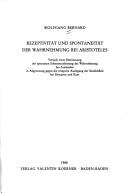| Listing 1 - 10 of 17 | << page >> |
Sort by
|

ISBN: 3519074524 9783519074526 Year: 1990 Volume: 3 Publisher: Stuttgart Teubner
Abstract | Keywords | Export | Availability | Bookmark
 Loading...
Loading...Choose an application
- Reference Manager
- EndNote
- RefWorks (Direct export to RefWorks)
Poetry --- Heraclitus --- Plutarch --- Proclus --- Allegory --- Classical literature --- History and criticism --- Theory, etc --- Aesthetics --- -Allegory --- Personification in literature --- Symbolism in literature --- Literature, Classical --- Literature --- Literature, Ancient --- Greek literature --- Latin literature --- -Theory, etc --- Heraclitus of Ephesus --- -Proclus --- -Plutarch --- -Plutarchus --- Plutarkh --- Plutarkhus --- Plutarque --- Plutarco --- Plutarchus, --- Plutarch, --- Ploutarchos --- Blūtārkhūs --- Плутарх --- Плутах --- Plutarh --- פלוטארכוס --- پلوتارخ --- Πλούταρχος, --- Pseudo-Plutarch --- Plutarkhosz --- Allegory. --- Theory, etc. --- -Aesthetics --- History and criticism&delete& --- Heraclitus, --- Proclus, --- Ploetarchos --- Plutarchus --- Eraclito, --- Geraklit, --- Heracleitus, --- Heraclit, --- Héraclite, --- Heraclito --- Hērakleitos, --- Heraklit, --- Herakʻŭlleitʻosŭ --- Kheraklit, --- היראקליטוס --- Ἡράκλειτος, --- Proclo, --- Proclo di Atene, --- Proclo di Costantinopoli, --- Proclo Licio Diadoco, --- Proclus Arabus, --- Proclus Diadochus --- Proclus Diadochus, --- Proclus Lycius, --- Prokl, --- Prokl Diadokh, --- Proklos, --- Proklos Diadochos, --- Proklus, --- Πρόκλος, --- Πρόκλος Πλατωνικός Διάδοχος, --- Πρόκλος Διάδοχος, --- פרוקלוס --- Aesthetics. --- Plutarchus Chaeronensis --- Héraclite --- Heraclitus van Efese --- Heraclitus van Ephese --- Herakleitos --- Eraclito --- Classical literature - History and criticism - Theory, etc --- Plutarch - Aesthetics --- Heraclitus - Aesthetics --- Proclus - Aesthetics

ISBN: 3873204193 Year: 1988 Volume: vol 19 Publisher: Baden-Baden Koerner
Abstract | Keywords | Export | Availability | Bookmark
 Loading...
Loading...Choose an application
- Reference Manager
- EndNote
- RefWorks (Direct export to RefWorks)
Perception --- -Psychology --- -Behavioral sciences --- Mental philosophy --- Mind --- Science, Mental --- Human biology --- Philosophy --- Soul --- Mental health --- Supraliminal perception --- Cognition --- Apperception --- Senses and sensation --- Thought and thinking --- History --- Early works to 1850 --- Aristoteles. --- Aristoteles --- Contributions in theory of perception. --- Psychology --- History. --- Early works to 1850. --- -History --- Aristote --- Aristotle --- Aristotile --- Aristotle. --- Aristote. Perception. --- Aristoteles. Waarneming.

ISBN: 3406478212 9783406478215 Year: 2001 Volume: 107 Publisher: München Beck
Abstract | Keywords | Export | Availability | Bookmark
 Loading...
Loading...Choose an application
- Reference Manager
- EndNote
- RefWorks (Direct export to RefWorks)
Greek drama (Tragedy) --- Oedipus (Greek mythology) in literature. --- Tragédie grecque --- Oedipe (Mythologie grecque) dans la littérature --- History and criticism. --- Histoire et critique --- Sophocles --- Closure (Rhetoric) --- Rhetoric, Ancient. --- Tragedy. --- Oedipus (Greek mythology) in literature --- Rhetoric, Ancient --- Tragedy --- Drama --- Classical languages --- Greek language --- Greek rhetoric --- Latin language --- Latin rhetoric --- Endings (Rhetoric) --- Last lines (Rhetoric) --- Peroration --- Rhetoric --- Sofokles --- Sophocle --- Sofocle --- Sophokles --- Sofocles --- Closure (Rhetoric). --- Tragédie grecque --- Oedipe (Mythologie grecque) dans la littérature --- Ancient rhetoric --- Sophocles. --- Oedipus --- In literature.
Book
ISBN: 3110948044 3598774524 Year: 2015 Publisher: Leipzig : B. G. Teubner,
Abstract | Keywords | Export | Availability | Bookmark
 Loading...
Loading...Choose an application
- Reference Manager
- EndNote
- RefWorks (Direct export to RefWorks)
Allegorese. --- Heraclitus, Ephesius. --- Plutarchus. --- Proclus, Diadochus. --- Heraclitus, --- Proclus, --- Plutarch --- Aesthetics.
Digital
ISBN: 9783110948042 9783598774522 Year: 2015 Publisher: Leipzig B. G. Teubner
Abstract | Keywords | Export | Availability | Bookmark
 Loading...
Loading...Choose an application
- Reference Manager
- EndNote
- RefWorks (Direct export to RefWorks)
Book
ISBN: 9783525304365 3525304366 Year: 2016 Volume: I,3 Publisher: Göttingen Vandenhoeck und Ruprecht
Abstract | Keywords | Export | Availability | Bookmark
 Loading...
Loading...Choose an application
- Reference Manager
- EndNote
- RefWorks (Direct export to RefWorks)
Platons Kriton spielt im Jahr 399 v.Chr. Sokrates erwartet im Gefangnis seine Hinrichtung, die sich aufgrund kultischer Verpflichtungen Athens verzogert. Sein Freund Kriton besucht ihn, um ihn zur Flucht zu bewegen. Sokrates lehnt diesen Vorschlag jedoch ab, weil auch erlittenes Unrecht nicht dazu berechtigt, selbst Unrecht zu tun. In diesem Dialog demonstriert Platon, wie man methodisch sauber und philosophisch uberlegt eine Frage konkreten individuellen Handelns entscheidet. Der erstmals auf Deutsch verfasste Kommentar legt aufbauend auf einer philologisch prazisen Ubersetzung besonderen Wert auf die genaue Nachzeichnung und Analyse der philosophischen einschliesslich der staatstheoretischen Argumentation. Dabei diskutiert er auch Bezuge zu modernen Positionen. So geht es im Kriton etwa nicht um die Frage eines Widerstandsrechts, sondern darum, ob und wann man sich in einem Rechtsstaat einem letztinstanzlichen Fehlurteil widersetzen beziehungsweise entziehen darf.
Crito (Plato) --- Justice --- Philosophy, Ancient --- Persecution --- Immortality (Philosophy) --- Socrates
Book
ISBN: 3860092146 Year: 2001 Publisher: Rostock Universität Rostock
Abstract | Keywords | Export | Availability | Bookmark
 Loading...
Loading...Choose an application
- Reference Manager
- EndNote
- RefWorks (Direct export to RefWorks)
Classical literature --- Classical philology --- History and criticism
Book
ISBN: 3860092227 Year: 2001 Publisher: Rostock Universität Rostock. Philosophische Fakultät
Abstract | Keywords | Export | Availability | Bookmark
 Loading...
Loading...Choose an application
- Reference Manager
- EndNote
- RefWorks (Direct export to RefWorks)
Democracy --- Poverty --- Social ethics
Book
ISBN: 3860091905 Year: 2000 Publisher: Rostock Universität Rostock. Philosophische Fakultät
Abstract | Keywords | Export | Availability | Bookmark
 Loading...
Loading...Choose an application
- Reference Manager
- EndNote
- RefWorks (Direct export to RefWorks)
Book
ISBN: 3860092391 Year: 2002 Publisher: Rostock Universität Rostock. Philosophische Fakultät
Abstract | Keywords | Export | Availability | Bookmark
 Loading...
Loading...Choose an application
- Reference Manager
- EndNote
- RefWorks (Direct export to RefWorks)
Language and culture --- Language and languages --- Translating and interpreting --- Religious aspects
| Listing 1 - 10 of 17 | << page >> |
Sort by
|

 Search
Search Feedback
Feedback About UniCat
About UniCat  Help
Help News
News